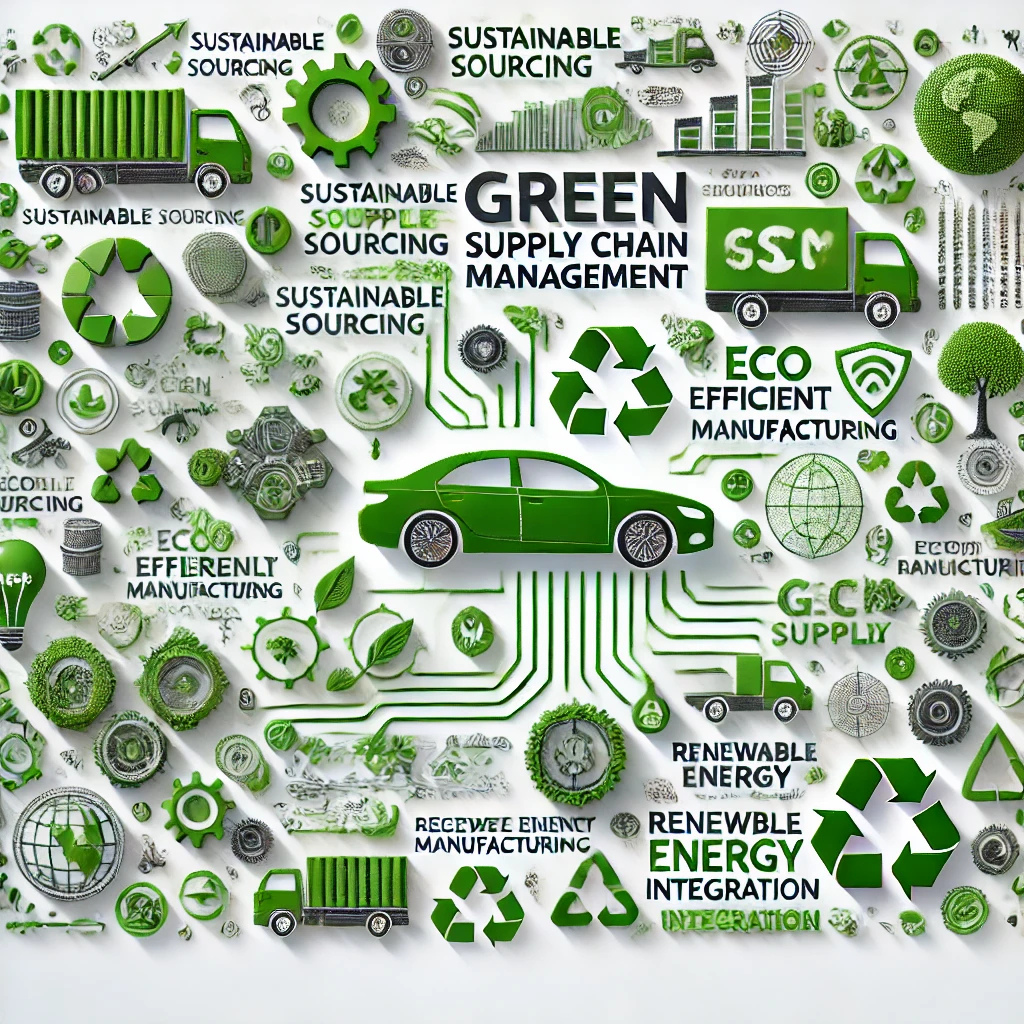Green Supply Chain Management in the Automotive Industry: Strategies for Reducing Environmental Impact
The automotive industry has long been a significant contributor to environmental degradation, primarily through carbon emissions, resource depletion, and waste generation. As global awareness of environmental issues rises, the concept of Green Supply Chain Management (GSCM) has emerged as a pivotal strategy for automotive manufacturers to mitigate their ecological footprint. GSCM integrates environmentally friendly practices into supply chain management, focusing on sustainable sourcing, production, distribution, and end-of-life processes (Feng et al., 2024). This review critically examines various strategies within GSCM implemented by the automotive industry and assesses their effectiveness in reducing environmental impacts.
One of the primary strategies in GSCM is the adoption of sustainable sourcing practices. Automotive companies are increasingly sourcing materials from environmentally responsible suppliers who prioritize sustainability in their operations (Lukin et al., 2022). For instance, major manufacturers like Ford and General Motors have committed to using recycled materials in their production processes, significantly reducing the need for virgin resources. This approach not only minimizes the environmental impact associated with resource extraction but also fosters a circular economy where materials are reused, thus reducing waste. In addition to sustainable sourcing, another crucial strategy is the implementation of eco-efficient manufacturing processes.

The automotive industry is actively pursuing initiatives to reduce energy consumption and waste during production. For example, Toyota has adopted the "Toyota Production System," which emphasizes lean manufacturing and waste reduction. This approach has led to significant improvements in energy efficiency, with the company reporting a 40% reduction in energy consumption per vehicle produced since 2002 (Toyota, 2020). By optimizing manufacturing processes, automotive companies can decrease their overall environmental impact while simultaneously enhancing operational efficiency. Furthermore, the integration of renewable energy sources into manufacturing operations is gaining traction as part of GSCM strategies. Companies such as BMW are increasingly investing in renewable energy, aiming to power their production facilities with 100% renewable energy by 2025 (BMW Group, 2020). This shift not only reduces greenhouse gas emissions but also positions companies as leaders in sustainability, appealing to environmentally conscious consumers.
Logistics and distribution also play a crucial role in GSCM within the automotive industry. Effective logistics strategies can significantly reduce the carbon footprint associated with the transportation of materials and finished products. For instance, Volkswagen has implemented an efficient logistics network that optimizes routes and consolidates shipments to minimize fuel consumption (Volkswagen, 2019). Additionally, many automotive companies are exploring alternative transportation modes, such as rail or electric vehicles, for their supply chains to further decrease their environmental impact. End-of-life management is another critical aspect of GSCM in the automotive sector. Automotive manufacturers are increasingly focusing on the recyclability of their products to ensure that materials can be reclaimed and reused at the end of a vehicle’s life cycle. For example, Honda has developed a comprehensive recycling program that aims to recycle 100% of its vehicles at the end of their life (Honda, 2020). By implementing effective end-of-life management strategies, automotive companies can significantly reduce waste and promote resource recovery.
While the strategies outlined above demonstrate the automotive industry's commitment to GSCM, several challenges remain. One of the primary obstacles is the complexity of global supply chains, which can make it difficult for manufacturers to ensure that all suppliers adhere to sustainability standards. Additionally, the initial costs associated with implementing sustainable practices can deter some companies from adopting GSCM principles. However, the long-term benefits of sustainability, including cost savings from improved efficiency and enhanced brand reputation, often outweigh these initial investments.

In conclusion, Green Supply Chain Management represents a vital pathway for the automotive industry to reduce its environmental impact. Through sustainable sourcing, eco-efficient manufacturing, renewable energy integration, optimized logistics, and effective end-of-life management, automotive companies are making significant strides towards sustainability. While challenges persist, the ongoing commitment to GSCM is crucial for the industry’s transition to a more sustainable future. As consumer awareness and regulatory pressures increase, it is imperative for automotive manufacturers to continue innovating and implementing strategies that promote environmental responsibility.
References
- BMW Group. (2020). Sustainability Report 2020. Retrieved from BMW Group Website
- Feng, T., Qamruzzaman, M., Sharmin, S. S., & Karim, S. (2024). Bridging Environmental Sustainability and Organizational Performance: The Role of Green Supply Chain Management in the Manufacturing Industry. Sustainability, 16(14), 5918–5918. https://doi.org/10.3390/su16145918
- Honda. (2020). Honda Environmental Annual Report 2020. Retrieved from Honda Global Website
- Lukin, E., Krajnović, A., & Bosna, J. (2022). Sustainability Strategies and Achieving SDGs: A Comparative Analysis of Leading Companies in the Automotive Industry. Sustainability, 14(7), 4000.
- Toyota. (2020). Sustainability Report 2020. Retrieved from Toyota Global Website
- Volkswagen. (2019). Sustainability Report 2019. Retrieved from Volkswagen Group Website